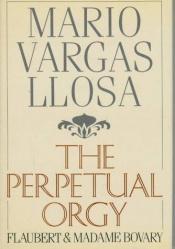La orgía perpetua: Flaubert y Madame Bovary
Blurb
The Perpetual Orgy: Flaubert and Madame Bovary is a book-length essay by the Nobel Prize–winning Peruvian novelist Mario Vargas Llosa which examines Flaubert's Madame Bovary as the first modern novel. The first part of the book has an autobiographical tone; Vargas Llosa then goes on to examine the structure and meaning of Madame Bovary as well as its role in the development of the modern novel. First published in Spanish in 1975, the book was translated into English in 1986 by Helen Lane.According to Julian Barnes:
Most of The Perpetual Orgy, at last available in Helen Lane's elegant translation, is a discussion of the genesis, execution, structure and technique of Madame Bovary. It is the best single account of the novel I know. Flaubertistes will instantly set it alongside Francis Steegmuller's classic Flaubert and Madame Bovary; students of literature who want to know how a novel works could not be better advised than to listen to Mr. Vargas Llosa hunched over this masterpiece like some vintage car freak over the engine of a Lagonda.
John Gross, also reviewing the Helen Lane translation for The New York Times, praised the book's treatment of Flaubert's technical mastery:

 English
English Español
Español Deutsch
Deutsch




Member Reviews Write your own review
Be the first person to review
Log in to comment